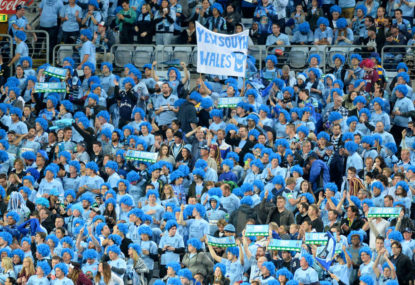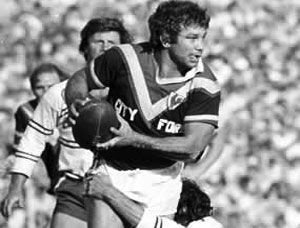Why all the pieces now Fitz for Sharks to shed flat-track bullies reputation and show they’re the real deal
There is only one way for Cronulla to shake off their reputation for being flat-track bullies. They are off to an impressive start in…

Looking back on the first official State of Origin match, at Lang Park on July 8, 1980, it’s amazing how momentous and resonant it still feels.
While New South Wales and Queensland had been playing each other for years, this was the first time that the rules had been changed from State of Residency to State of Origin.
It was an experiment that was only permitted because the Blues had won the first two fixtures of 1980. With nothing left to lose, the time seemed right to experiment with a new format.
At the same time, it was an experiment that had the potential to provide enormous dividends for the Maroons.
Given the current Queensland dynasty, it’s strange to think that the Maroons hadn’t won a single one of their interstate standoffs.
By relaxing the eligibility laws from state of residency to state of origin, Queensland were given a real shot at building a stronger presence and platform within Australian Rugby League generally.

As many commentators pointed out, this happened to be one of the best Queensland squads in years, both in terms of size and mobility. If there was ever going to be a team to champion the new Origin format, it was this one.
In an emotional twist, the new laws allowed Arthur Beetson to play for and captain the Maroons side for the first time.
At 35, Beetson was nearing the end of his career.
While he had started with Redcliffe in the early 60s, he hadn’t played in Queensland for some time. Following stints with the Tigers, Hull K.R. and Easts, he was currently signed with the Eels, although he would return to Redcliffe for one last year in 1981.
All of a sudden, this Queensland icon was able to play for a Queensland side.
It must have played some small part in his decision to return to Redcliffe and bookend his career north of the border.
If Origin 1980 was a swansong for Beetson, then it was a prophecy for one young ‘Malcolm Meninga’.
While Meninga had performed well at centre for Queensland in 1979, it was during this match – held on his twentieth birthday – that he really started to come into his own at a representative level.
In terms of actual gameplay, Meninga didn’t get a lot of opportunities with the ball, with centre partner Chris Close taking home a well deserved man of the match.
It was Meninga’s two-pointers, however, that sealed the deal for the Maroons – an impressive seven from seven, making him responsible for close to three quarters of the points scored by Queensland on the night.
Ten minutes into the second half, New South Wales and Queensland would have been neck and neck at one try each were it not for the difference Meninga’s signature toe-poke kicks had made.
Similarly, it was Meninga who made the last really emphatic gesture in the match – kicking the ball into touch after yet another penalty for Queensland.
Moments later, Graham Eadie would go for a similar kick, but with the siren sounding just before he could place boot to ball, it was Meninga who had the final word.
Between Beetson and Meninga, there was a strong sense of generational transition, especially with John Lang also seeing out the last year of his career as well.
That sense of transition was reflected in the game play itself, which feels amazingly quick and fluid by today’s standards, with referee Billy Thompson only stopping or slowing down the ball for the most drastic encounters.
Both more contemplative and more brutal than contemporary Origin, there was a great sense of focus and intensity that can sometimes get lost or dispersed among all the advertising and media spectacle surrounding today’s game.
From Rohan Hancock’s punch two minutes in, it was clear that the game was going to continually simmer on the verge of a hitup.
Sure enough, Thompson had to physically separate players at the 25-minute mark, with Beetson coming away from an aborted scrum with half his shirt torn off.
Minutes later the first official Origin all-in brawl broke out at the very moment at which it felt as if New South Wales might come back and prove that the Maroons’ dominance over the first half had been a fluke.
Once the play started again, all kinds of satellite fights and confrontations took place around the fringes of the action.
Sometimes they were more interesting than the actual game, with Rod Morris and Gary Hambly putting in a particularly memorable standoff about thirty minutes in.
Let’s not forget, too, that many of these players had squared up against each other the previous weekend, with both Greg Oliphant and Tommy Raudonikis still bearing the bruises of a particularly intense Jets-Tigers clash.
Still, no amount of New South Wales attitude could prevent Kenny Boustead crossing for the first Maroons try of the night, the culmination of a great piece of shifting play that kept Queensland poised at the precipice of a sliding Blues defensive line.
From there, Queensland were fairly dominant, despite some brilliant Blues moments.
There was a great penalty kick from Mick Cronin towards the end of the first half, a saved ball from Greg Brentnall just after half time and a powerhouse performance from Graeme Wynn in the forwards.
There was a brilliant flick pass from Cronin to Eadie to set up Brentnall for the first Blues try of the night.
There was a burst through an extraordinarily strong Maroons backline from Raudonikis for the second New South Wales try.
And there was a prolonged stint on the Queensland line at the back of the second half that, unfortunately, came to nothing.
But it was clear from the very outset that the Maroons deserved to win.
At the same time, it’s hard to say exactly who won the first State of Origin.
Technically, Queensland won the first State of Origin match.
But, given that the Blues had won the previous two interstate clashes in 1980, the question of who won the year as a whole becomes a little more murky.
Perhaps the real first winner of State of Origin should be dated to 1982, the first year that the Origin selection criteria were applied to all three annual interstate matches.
Or perhaps it’s appropriate that even the question of who won this first year of Origin probably comes down to your own opinions, biases and affiliations.
No rugby league event is harder to talk about impartially than Origin, so it feels right that the question of who “won” in 1980 is bound to remain contentious, depending on whether you’re talking to a Blues or Maroons supporter.